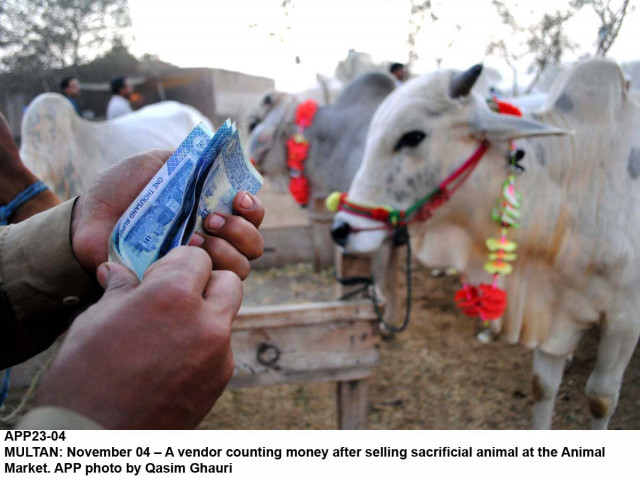Eid and the laws of economics
Somebody makes a little more money during this period, in most cases, a not-so-rich man trying to make an extra buck.

Eid and the laws of economics
In Pakistan, the Eid after Hajj is not marked by any quarrel over the sighting of the moon because of the consensual ritual of Hajj which takes place in Saudi Arabia. But before Eidul Fitr, our clerics get into arguments with each other over the sighting of the moon and we have Eid on different days in the country and elsewhere in the Muslim world. However, what they have in common is that both Eids are increasingly becoming subject to economics.
There are fallacies to be removed. We should not believe that economics will suspend its fundamental laws in deference to religious feeling. Why do we want the law of supply and demand suspended when suddenly our consumption goes up either in quantity or quality? If people start reading newspaper archives from 1947 onwards, they would find many an editorial indulging in self-flagellation over price hikes during Ramazan and during the period when sacrificial animals are to be bought.
There is an uncontrolled emotion that says that somehow during these two occasions the supplier should ignore economics and make a sacrifice of his trade in order to benefit the faithful masses. There are reports of profiteering during the fasting month. What sellers should do is sacrifice their margin of profit during Ramazan, moved by Muslims forgoing food in the name of Allah.
What happens, in fact, is economics. In the fasting season, even the poor try to make the keeping and breaking of the fast a special occasion by arranging food that is not their routine. This means additional consumption, which translates into increased demand. This, following a basic law of economics, leads to a rise in the prices. The month passes amid accusations of impiety and lack of mercy.
The Eid of sacrifice is more overtly subject to economics. The animals that are to be bought for sacrifice are grown in the countryside. They are brought to the big cities where people have the earnings commensurate with the price tags on these animals as opposed to rural areas where the cash economy is weak. What the sacrificial animals do is transfer some of the wealth created in the cities to the countryside. The demand is inelastic in many households, where sacrifice is taken to be compulsory, regardless of income. Each year, the sacrificial animals are more expensive in relation to the earnings of the consumer.
This year, there was a fall in the number of animals bought for sacrifice. The reason should be obvious: prices were too high. The numbers have been falling for some years now and this is only to be expected, given the rising prices of sacrificial animals. Why is the supplier not flexible in the face of this demand curtailment? He has options. One option is to go from city to city to take advantage of relative prosperity. The other option is to take the animals across the national frontier and exploit the neighbouring state’s fondness for meat. The butcher shop is the third option.
The media has created the yearly stereotype of national moaning over high prices in relation to both Eids, as if these special occasions were times for self-rebuke. This is not right. There is economics working in all transactions and there is no reason that this process be suspended on Eid. And if there is rising poverty in the country because of low growth and policies that seem to reward those who are already quite well-off, these laws are bound to become more highlighted. Somebody makes a little more money during this period and, in most cases, he is a not-so-rich man trying to make an extra buck.
Published in The Express Tribune, November 7th, 2011.















COMMENTS
Comments are moderated and generally will be posted if they are on-topic and not abusive.
For more information, please see our Comments FAQ